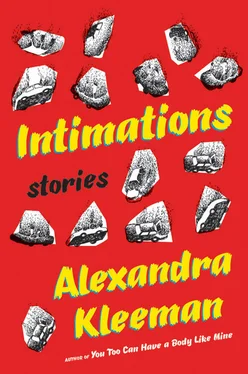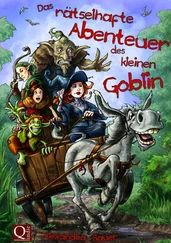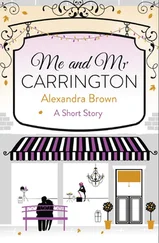Karen was surprised to see herself push past the fountain she had intended to show Lila. But what would they do with the fountain anyhow? Crouch alongside it, peer over its gray lip into the fake blue water at a smattering of pennies, twigs, the drifting body-casings of insects. Lift the baby up and dangle her over the surface so that she could swipe at the dirty water with her hand. In the larger sense, all of this would be forgotten by the child almost as it was happening. Even now, as something inside her mother unspooled nearby, Lila seemed unchanged. She didn’t cry, she let out only a prolonged gurgle as her body shook, propelled over gravel. Her blue eyes reached eagerly for the green grass, the rough stones. Karen took Lila’s silence as license to continue: the walk was loosening her, it erased the ugliness of Puldron’s mouth, the compacted feeling that came with being at home.
Instead of the fountain, she would take her baby to see the water. But there was no real water in this city, Karen thought to herself, water you could sink your body into to feel more alive. They left the park and passed the library, the grocery, an Italian restaurant that Karen hadn’t eaten at since she was in college, visiting a friend. They passed a bodega where a woman sat on a squat stool, arranging many attractive, brightly colored oranges so that they covered the misshapen yellowing ones beneath. The other mothers were envious of Lila’s personality: she scored very well on the rubrics for head-turning, object memory, and facial recognition, which indicated that she was in the process of developing a high IQ — but she rarely cried or complained, which allowed the other mothers to experience her as a being of pure adorability, a sponge for affection that asked nothing in return. But the daughter that Karen had wanted was a daughter who talked, who chattered, who would help her become more of a human being and who would remake the world for her in her own eyes, a daughter she hoped she would have in the future. “I love you just like you are,” she said out loud.
In Karen’s grip the stroller’s handlebar was shaking, twisting left and right and left, as though there were someone holding on to the front of the stroller, pulling it. Lila’s soft white face began to crumple, from its open center came a high wail as the contraption shook her body. Karen stopped and went to see what had gone wrong. As the apparatus tipped forward it drew a lazy arc in the air, moving slow and quick at the same time, making it look like the baby was diving forward. By falling onto her knees and thrusting her arms blindly out, Karen was just able to keep Lila from hitting the sidewalk.
Karen looked at the stroller, at the child. The inside of her head felt slow with panic, and the sound of her daughter crying muffled her thoughts. The wheel had come off, she could see it a few yards back, and who knew where the piece that held it on had been lost? The stroller would have to be left behind; she couldn’t carry it and the baby both. At the same time, the stroller was so expensive she knew she would have to come back for it. It had been a high-quality model, brightly colored and flashy. It had a chassis of feather-light, heat-resistant titanium, and its parts had been manufactured in Germany by a company that made some of the less important parts of airplanes. She and her husband had agreed it was the best model, safe and firmly made. When she wheeled it around, with its geometric-patterned diaper bag and its plastic frame shiny as a fast food playground, she felt bumbling, cartoonish, gaudy like a clown.
Karen gathered Lila, red with tears, into her arms and began walking. It was only a few moments later that she remembered to think of a place to go.
In the café in the neighborhood where people came mostly to shop, there were only two other customers: a young man on a laptop, his large head squeezed between headphones, and an older woman eating a salad, who might have been a young grandmother. She sat down at the table farthest from both of them. Her arms ached, and she had blisters where heel and instep met the straps of her sandals. She felt guilty. She didn’t want to go back for the stroller, but to buy a new one would symbolize to her husband that she was unable to keep valuable objects in her possession. “Karen,” he’d said tenderly when she lost a good sweater that she’d just bought, “You’re a net with one big hole in it. Everything just slips through you.” When she got up from the sofa and prepared to leave the house with the new stroller, certain to be similarly ugly and large, she knew she’d feel his eyes on her, showing and stifling concern at the same time.
With her gaze fixed on an empty corner, Karen adopted the flat facial expression of someone reading, though she had nothing to look at. She slid off her shoes. She just wanted to drink the sweet, tepid tea and think of nothing. But from the corner of her eye, she saw the older woman watching her between brief, performative glances at a magazine that had recently been rolled up into a small, tight tube. As it lay on the table, it curled slowly in on itself once again. Karen looked over at her, and looked away again too late.
“Did you borrow that shirt from someone?” the older woman asked, smiling toothily and leaning toward Karen.
“No,” Karen said. It was her own shirt. Karen turned to Lila and pretended that she was doing something involving and important with her. Taking a corner of Lila’s soft yellow blanket, she dabbed the little face gently, over and over again.
“Well, it’s very nice,” said the voice from behind her back.
Karen felt a tug on her sleeve and turned her head. The woman next to her was rubbing the fabric between her long finger and her thumb. The shirt was too big. It was a cotton blend, covered in a garish print of lilies and strawberries. In fact, Karen hated this shirt.
“Thank you,” she said stiffly, holding still.
“Has she started to say her words yet?” the woman asked, indicating Lila with a point of her fork. She leaned back and stabbed at her salad, making space for Karen to sit up straight in the seat.
“It’s too early,” Karen admitted, “too early for babbling, even.”
“That’s a lonely time. I know it. You two are together all day long, and there’s nobody even to say ‘mm-hmm.’” The woman laughed.
Karen nodded slowly.
“I’m Linda. How old are you, honey?” said Linda, holding out her hand.
“Thirty-two,” Karen answered, wiping her sweaty palm on her shorts and squeezing Linda’s outstretched hand for an instant. Linda smiled and nodded as though she wasn’t surprised. In her green silk blouse and pink patterned scarf, she was either somebody who understood colors very well or someone who didn’t understand them at all.
“And you feel a million years old inside, am I right?” Linda smiled winningly, her teeth sharply white in the dim lighting. Linda reminded Karen of a TV mother, someone who always had good advice and probably had never been bored, anxious, or confused in her life.
“I don’t know,” Karen said. “I feel strange .”
“Well, don’t we all.” Linda shrugged as, wrapped in blankets at her side, a long, escalating cry began to break from the baby. “You live life one way for, what, thirty years, you’ve just finally, barely gotten used to the way life is, and then BAM!” Linda swiped her finger against wailing Lila’s mouth. Lila quieted instantly. “They tell you that you gotta start learning life all over again. BAM! Isn’t that right?” Linda winked at Karen, and wiped the front and back of her hand on a napkin.
“How did you do that?” Karen exclaimed, truly impressed.
“Oh, just an old family trick. Old, old trick,” Linda said, leaning in. “A teensy dab of butter on the lips. Tamps them down like lambs.” Linda was different from other mothers Karen had met: when she gave advice, it wasn’t stuffy. She was full of stories. For every frustration Karen named, Linda knew someone who in fact had gone through just that problem herself. Linda was a sort of freelance psychoanalyst, consultant, therapist, whatever you please. Diverse but well-respected people, she said, had sought her services for issues ranging from their child’s learning disability to what type of second career they should take on. She had just got these great new business cards printed on 100 percent cotton paper, the real thing, only she didn’t have any with her today.
Читать дальше












